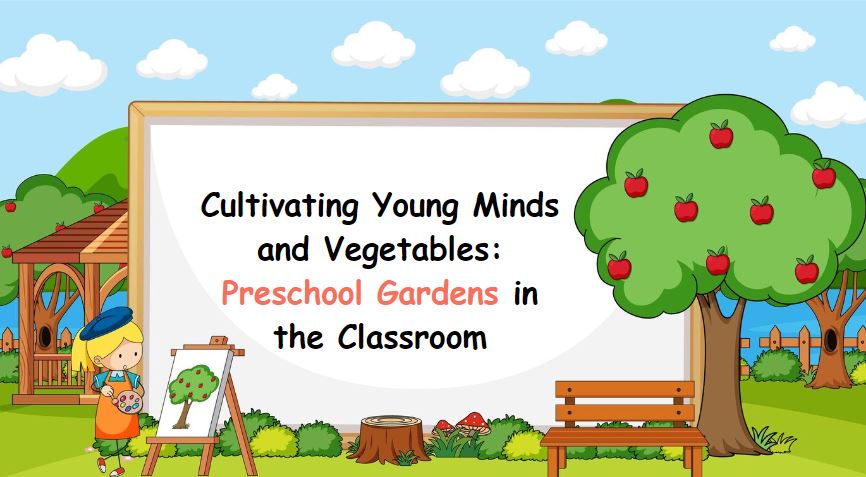Cultivating Young Minds and Vegetables: Preschool Gardens in the Classroom
Preschools in India are embracing an innovative approach to early education - the incorporation of classroom gardens. These mini-green spaces not only introduce children to the wonders of nature but also serve as valuable educational tools. Whether you're considering preschools in India, searching for the nearest preschool to you, or exploring a play school near you, let's delve into the world of preschool gardens and how they are growing young minds and vegetables right in the classroom.

Caring for a garden requires patience and responsibility. Children learn to water the plants regularly, remove weeds, and protect the garden from pests. These activities instill values of diligence and accountability.
Here is the listing of top Preschool in Dwarka, Preschool in Greater Noida
Preschool gardens are indeed a thriving trend in early education. Whether you're exploring preschools in India, seeking the nearest preschool to me, or looking for a play school near you, consider the educational benefits of classroom gardens. These green spaces are nurturing not only young minds but also a lifelong love for the environment and healthy living.
Originally Published Here.
1. Hands-On Learning:
Preschools have long recognized the importance of hands-on learning. The introduction of classroom gardens takes this concept a step further. Children get their hands dirty as they plant seeds, water plants, and watch them grow. This tactile experience fosters a deeper understanding of the natural world.2. Connecting with Nature:
In our increasingly urbanized world, it's vital for children to connect with nature. Classroom gardens provide a green oasis in the school environment. These spaces allow children to observe and interact with plants, insects, and the changing seasons.3. Learning Science:
Preschool gardens are outdoor laboratories. Children learn about the life cycle of plants, the role of sunlight and water in growth, and the importance of caring for living things. These lessons form the foundation for scientific understanding.4. Promoting Healthy Eating Habits:
Preschool gardens often include the cultivation of vegetables. Children not only learn how these vegetables grow but also develop a positive attitude toward them. The experience of growing and harvesting their own food encourages healthy eating habits.5. Responsibility and Patience:
Caring for a garden requires patience and responsibility. Children learn to water the plants regularly, remove weeds, and protect the garden from pests. These activities instill values of diligence and accountability.
6. Artistic Expression:
Gardens are a canvas for creativity. Children can paint, draw, or write about their garden experiences. Artistic expression becomes a natural way to communicate their observations and feelings.7. Environmental Awareness:
Preschool gardens foster environmental awareness. Children learn about the importance of conserving resources, reducing waste, and protecting the environment for future generations.8. Social Skills:
Working in a garden is often a group activity. Children collaborate, share tools, and discuss their observations. This social interaction builds essential communication and cooperation skills.9. Parental Engagement through the Parent App:
Preschools frequently use a parent app to update parents on classroom activities, including the garden. The app provides a window into the children's learning experiences and encourages parental involvement.Here is the listing of top Preschool in Dwarka, Preschool in Greater Noida
10. Educational Fun:
Above all, classroom gardens make learning fun. Children look forward to their time in the garden, and it doesn't feel like work. As they engage with the natural world, they're absorbing important lessons without even realizing it.Preschool gardens are indeed a thriving trend in early education. Whether you're exploring preschools in India, seeking the nearest preschool to me, or looking for a play school near you, consider the educational benefits of classroom gardens. These green spaces are nurturing not only young minds but also a lifelong love for the environment and healthy living.
Originally Published Here.

Comments
Post a Comment